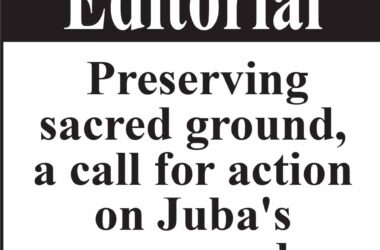By Gama Hassan Oscas
The appointment of His Worship Emmanuel Khamis as the Acting Mayor of Juba City Council brings hope for positive change in addressing critical issues that have plagued the city for far too long. This opinion piece will delve into the pressing concerns of poor garbage collection, corruption in garbage fee collection, strained relationships with taxpayers, over-taxation without clear guidelines, unprofessional tax collection methods, neglect of sanitary issues, and the lack of infrastructure development. Furthermore, it will provide actionable recommendations to help the new administration revitalize Juba and foster a prosperous future for its residents.
Reorganizing Administration and Recruiting Competent Staff: The first step towards a successful revitalization of the Juba City Council is to reorganize its administration. This should involve recruiting competent and well-trained staff members who possess the necessary skills to effectively address the city’s challenges. By employing professionals with expertise in waste management, urban planning, taxation, and public relations, the city council can ensure the efficient delivery of services to its residents.
Transparent Bidding Processes for Garbage Collection Contracts: To combat corruption in garbage fee collection, the city council must establish transparent bidding processes for contracting companies responsible for waste management. This approach will ensure that qualified and reputable firms are chosen based on their capabilities, experience, and cost-effectiveness. Through increased competition, the council can select the most competent service providers, thus enhancing garbage collection efficiency and reducing instances of corruption.
Improving Transportation System: The inefficient transportation system in Juba exacerbates traffic congestion and accidents. The city council should invest in modernizing the transportation infrastructure by replacing tricycles and old taxis with new, safer buses. This upgrade will not only enhance road safety but also alleviate traffic congestion, allowing for smoother movement within the city.
Regulating Parking and Creating Commercial Parking Spaces: The lack of regulation on parking exacerbates traffic issues and obstructs public access. The city council should enforce parking regulations by taxing car owners who occupy public roads for extended periods. Additionally, creating commercial parking spaces in bustling areas such as Juba Town, Konyokonyo, and Customs will provide convenient alternatives for businesses and visitors, reducing on-road parking congestion.
Strengthening Relationships with Taxpayers: The city council must prioritize building strong relationships with taxpayers. This can be achieved through regular engagement and tax education programs aimed at enlightening taxpayers about their rights, responsibilities, and the benefits of paying taxes. By fostering a sense of trust and transparency, the council can encourage voluntary compliance and minimize instances of harassment and intimidation during tax collection.
Supporting Local Entrepreneurship: Juba City Council should create an enabling environment for local entrepreneurship to flourish. This can be accomplished by providing tax incentives, such as tax holidays, to encourage new businesses. Moreover, streamlining the taxation process and implementing clear guidelines will ensure that small businesses are not burdened by excessive taxation, fostering an environment conducive to their growth and development.
Regulating Water Sale and Enhancing Sanitary Practices: Juba City Council should regulate the pricing of water, ensuring affordability for the majority of residents. Exploitative pricing practices must be curbed to ensure that Nile water, which is abundant and accessible, benefits all members of the community. Additionally, the council should prioritize the enforcement of sanitary practices, preventing the flow of wastewater into public roads and the dumping of waste on streets, which pose health hazards to the community.
Urban Planning and Beautification Initiatives: Investing in urban planning and beautification projects will enhance the aesthetics of Juba while improving the quality of life for its residents. The city council should collaborate with experts in urban design and draw inspiration from successful models implemented in other modern cities worldwide. Emphasizing the importance of green spaces, tree planting initiatives, and sustainable development will contribute to a cleaner, healthier, and more visually appealing city.
Conclusion: The appointment of His Worship Emmanuel Khamis as the Acting Mayor of Juba City Council marks a turning point in the city’s trajectory. By addressing the issues of poor garbage collection, corruption in garbage fee collection, strained relationships with taxpayers, over-taxation, unprofessional tax collection methods, neglect of sanitary issues, and infrastructure deficiencies, the new administration can usher in a new era of progress and prosperity. Through reorganization, transparent contracting processes, transportation improvements, regulation of parking, taxpayer engagement, support for local entrepreneurship, and urban planning initiatives, Juba can transform into a city that residents can be proud of—a city that thrives and serves its citizens with efficiency, fairness, and accountability.
The writer can be reached on the email: oscarsgama @gmail.com




